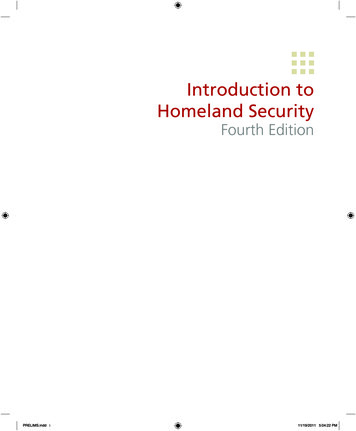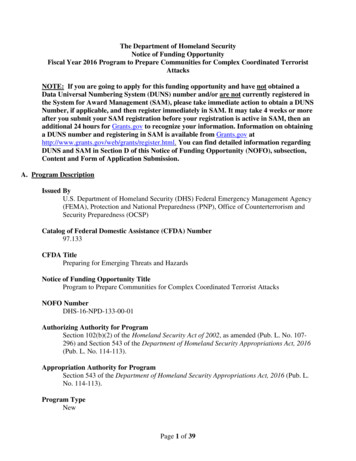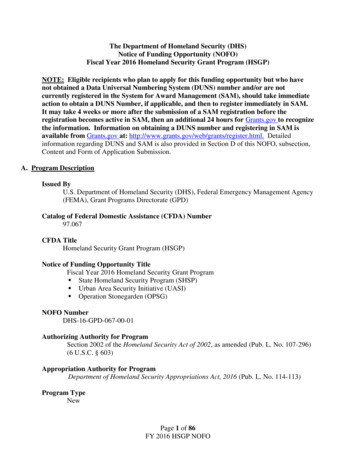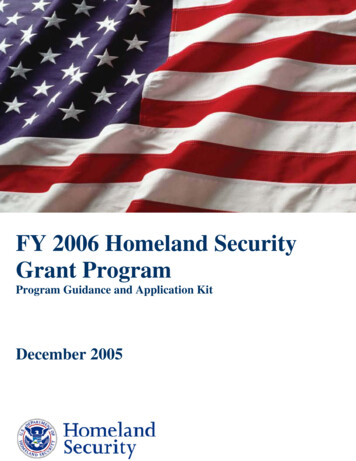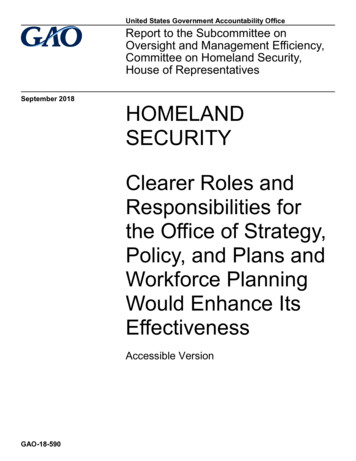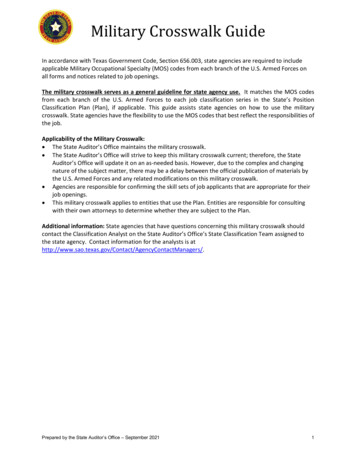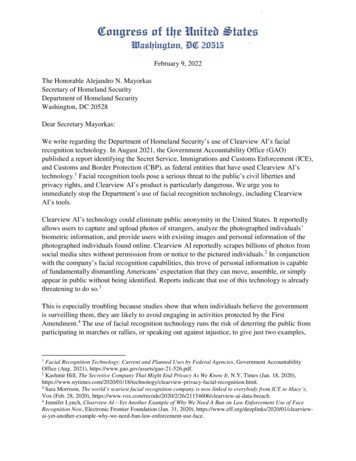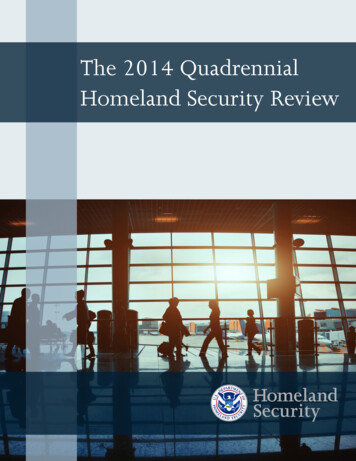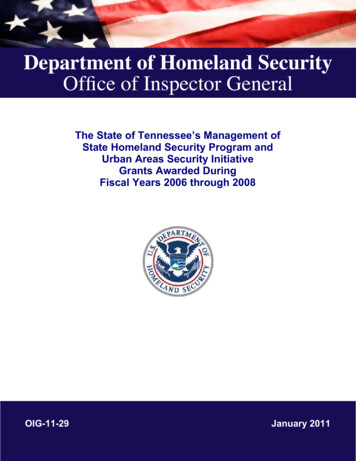
Transcription
Department of Homeland SecurityOffice of Inspector GeneralThe State of Tennessee’s Management ofState Homeland Security Program andUrban Areas Security InitiativeGrants Awarded DuringFiscal Years 2006 through 2008OIG-11-29January 2011
Office ofInspector GeneralU.S. Department of Homeland SecurityWashington, DC 20528HomelandSecurityJAN 13 2011PrefaceThe Department of Homeland Security (DHS) Office of Inspector General (OIG) wasestablished by the Homeland Security Act of2002 (Public Law 107-296) by amendmentto the Inspector General Act of 1978. This is one of a series of audit, inspection, andspecial reports prepared as part of our oversight responsibilities to promote economy,efficiency, and effectiveness within the department.The attached report presents the results of the audit ofthe State of Tennessee'smanagement of State Homeland Security Program and Urban Areas Security Initiativegrants awarded during Fiscal Years 2006 through 2008. We contracted with theindependent public accounting firm Foxx & Company to perform the audit. The contractrequired that Foxx & Company perform its audit according to generally acceptedgovernment auditing standards. Foxx & Company's report identifies one reportablecondition where State management of the grant funds could be improved, resulting in onerecommendation addressed to the Assistant Administrator, Grant Programs Directorate,Federal Emergency Management Agency. Foxx & Company is responsible for theattached auditor's report dated October 22,2010, and the conclusions expressed in thereport.The recommendations herein have been developed to the best knowledge available to ouroffice, and have been discussed in draft with those responsible for implementation. Wetrust this report will result in more effective, efficient, and economical operations. Weexpress our appreciation to all of those who contributed to the preparation of this report. / Anne L. RichardsAssistant Inspector General for Audits
October 22, 2010Ms. Anne L. RichardsAssistant Inspector General for AuditsOffice of Inspector GeneralU.S. Department of Homeland Security245 Murray Drive, S.W. Building 410Washington, D.C. 20528Dear Ms. Richards:Foxx & Company performed an audit of the State of Tennessee’s management of theDepartment of Homeland Security’s State Homeland Security Program and Urban AreasSecurity Initiative grants for Fiscal Years 2006 through 2008. The audit was performedaccording to our Task Order No. TPD-FIG-BPA-07-0007 dated September 29, 2009.This report presents the results of the audit and includes recommendations to helpimprove the State’s management of the State Homeland Security Program and UrbanAreas Security Initiative grants.We conducted the audit according to applicable Government Auditing Standards, 2007revision. The audit was a performance audit as defined by Chapter 1 of the Standardsand included a review and report on program activities with a compliance element.Although the audit report comments on costs claimed by the State, we did not perform afinancial audit, the purpose of which would be to render an opinion on the State ofTennessee’s financial statements or the funds claimed in the Financial Status Reportssubmitted to the Department of Homeland Security.We appreciate the opportunity to have conducted this audit. Should you have anyquestions, or if we can be of any further assistance, please call me at (513) 639-8843.Sincerely,Foxx & CompanyMartin W. O’NeillPartner
Table of Contents/AbbreviationsExecutive Summary . 1Background . 2Results of Audit . 5Compliance with Inventory Requirements . 6Recommendation . 8Management Comments and Auditors’ Analysis . 8AppendicesAppendix A: Purpose, Scope, and Methodology . 9Appendix B: Organization Chart . 12Appendix C: Report Distribution . 13AbbreviationsDHSFEMAFYOIGDepartment of Homeland SecurityFederal Emergency Management AgencyFiscal YearOffice of Inspector General
OIGDepartment of Homeland SecurityOffice of Inspector GeneralExecutive SummaryFoxx & Company completed an audit of the State of Tennessee’sManagement of State Homeland Security Program and UrbanAreas Security Initiative grants awarded during fiscal years 2006through 2008. The audit objective was to determine whether theState distributed and spent Homeland Security Grant Programfunds strategically, effectively, and in compliance with laws,regulations, and guidance. The audit included a review ofapproximately 40.9 million in State Homeland Security Programand Urban Areas Security Initiative grants awarded by the FederalEmergency Management Agency to the State of Tennessee.Generally, the State did an efficient and effective job ofadministering program requirements in accordance with grantguidance and regulations. The State used reasonablemethodologies for assessing threat, vulnerability, capability, andprioritized needs, and developed measurable goals and objectivesbased upon risk assessments. The State’s funding allocations werelinked to all-hazard capabilities. Also, the State’s procurementmethodology and practices were in conformance with federalrequirements. The State effectively monitored the grant programs.However, the State needed to improve its compliance withinventory requirements for equipment purchased with grant funds.Our one recommendation calls for the Federal EmergencyManagement Agency to initiate improvements which, ifimplemented, should help strengthen program management,performance, and oversight.Federal Emergency Management Agency and State officialsverbally concurred with our finding and recommendation, andelected not to provide written comments.The State of Tennessee’s Management of State Homeland Security Program andUrban Areas Security Initiative Grants Awarded During Fiscal Years 2006 through 2008Page 1
BackgroundThe Homeland Security Grant Program is a federal assistance grantprogram administered by the U.S. Department of HomelandSecurity (DHS), Grant Programs Directorate within the FederalEmergency Management Agency (FEMA). The current GrantPrograms Directorate, hereafter referred to as FEMA, began withthe Office of Domestic Preparedness, which was transferred fromthe Department of Justice to DHS in March 2003. The Office ofDomestic Preparedness was subsequently consolidated into theOffice of State and Local Government Coordination andPreparedness which, in part, became the Office of Grants andTraining, and which subsequently became part of FEMA.Although the grant program was transferred to DHS, applicableDepartment of Justice grant regulations and legacy systems stillwere used as needed to administer the program. For example,through Fiscal Year (FY) 2008 the Office of Justice Programs’Grants Management System was used to receive granteeapplications and to administer the award and reporting processes.Also, prior to the transfer, the State Administrative Agency enteredpayment data into the Office of Justice Programs’ Phone ActivatedPaperless Request System, which was a drawdown paymentsystem for grant funds. That payment system was replaced inApril 2007 by FEMA’s Payment and Reporting System. Thissystem allows grantees to make payment requests and completeand transmit their quarterly Financial Status Reports online.Homeland Security Grant ProgramThe Homeland Security Grant Program provides federal funding tohelp state and local agencies enhance their capabilities to prevent,deter, respond to, and recover from terrorist attacks, majordisasters, and other emergencies. The Homeland Security GrantProgram encompasses several interrelated federal grant programsthat together fund a range of preparedness activities, includingplanning, organization, equipment purchase, training, andexercises, as well as management and administration costs.Depending on the fiscal year, the program included some or all ofthe programs: State Homeland Security Program supports theimplementation of State Homeland Security Strategies toaddress the identified planning, organization, equipment,training, and exercise needs to prevent, protect against, respondThe State of Tennessee’s Management of State Homeland Security Program andUrban Areas Security Initiative Grants Awarded During Fiscal Years 2006 through 2008Page 2
to, and recover from acts of terrorism and other catastrophicevents. Urban Areas Security Initiative Program funds address theunique planning, organization, equipment, training, andexercise needs of high-threat, high-density Urban Areas, andassists the areas in building an enhanced and sustainablecapacity to prevent, protect against, respond to, and recoverfrom acts of terrorism. Law Enforcement Terrorism Prevention Program providesresources to law enforcement and public safety communities(working with their private partners) to support criticalterrorism prevention activities, including: establishing /enhancing fusion centers and collaborating with non-lawenforcement partners, other government agencies, and theprivate sector. Citizen Corps Program mission is to bring community andgovernment leaders together to coordinate the involvement ofcommunity members in emergency preparedness, planning,mitigation, response, and recovery. Metropolitan Medical Response System Program supportsthe integration of emergency management, health, and medicalsystems into a coordinated response to mass casualty incidentscaused by any hazard. Successful MMRS grantees reduce theconsequences of a mass casualty incident during the initialperiod of a response by having augmented existing localoperational response systems before an incident occurs.State Administrative AgencyThe governor of each state appoints a State Administrative Agencyto administer the Homeland Security Grant Programs. The StateAdministrative Agency is responsible for managing these grantprograms according to established federal guidelines. It is alsoresponsible for allocating funds to local, regional, and other stategovernment agencies.In 2003, Tennessee’s Governor designated the State ofTennessee’s Department of Military to be the State AdministrativeAgency for the Homeland Security Grant Programs. TheDepartment of Military administered all of the Homeland SecurityThe State of Tennessee’s Management of State Homeland Security Program andUrban Areas Security Initiative Grants Awarded During Fiscal Years 2006 through 2008Page 3
Grant Programs grants included in our audit. The State’shomeland security organizational chart is included in Appendix B.The State of Tennessee is divided into 3 Regions and 11 StateHomeland Security Districts, including 2 Urban Areas SecurityInitiative areas: Nashville and Memphis. District Councilscomprised of local government officials within the State HomelandSecurity Districts determine grant funding priorities within theDistricts. The Department of Military and the Office of HomelandSecurity work closely with the State Homeland Security Districtsand Urban Areas Security Initiative areas to support their needs,synchronize strategies, and establish consistent priorities acrossTennessee.Grant FundingThe State of Tennessee received approximately 54.5 million fromthe Homeland Security Grant Program during FYs 2006 through2008. As part of this program, the State received 40.9 million inState Homeland Security Program and Urban Areas SecurityInitiative grants. The State Administrative Agency awardedsubgrants to counties, state agencies, and two Urban AreasSecurity Initiative areas. The counties and urban areas purchasedequipment and distributed it to local governments and firstresponders. These entities also provided training and plannedexercises. The State of Tennessee subawarded State HomelandSecurity Program and Urban Areas Security Initiative grants to thefollowing: 2006: 64 subawards to 60 counties, 3 state agencies, and1 urban area;2007: 82 subawards to 77 counties, 4 state agencies, and1 urban area; and2008: 71 subawards to 65 counties, 4 state agencies, and2 urban areas.Table 1 displays a breakdown of the Homeland Security GrantProgram awards to the State of Tennessee by year.The State of Tennessee’s Management of State Homeland Security Program andUrban Areas Security Initiative Grants Awarded During Fiscal Years 2006 through 2008Page 4
Table 1TennesseeHomeland Security Grant Program AwardsFiscal Years 2006 through 2008(‘000s)Funded ActivityFY 2006State HomelandSecurity ProgramUrban AreasSecurity InitiativeLaw EnforcementTerrorismPrevention ProgramCitizen CorpsProgramMetropolitanMedical ResponseSystem ProgramTotalFY 2007FY 2008Total 4,780 8,250 12,880 25,910 4,200 4,590 6,236 15,026 3,480Not 5,890 Applicable 9,370 373 929 13,762282 1,033 20,045 287 1,285 20,688942 3,247 54,495Foxx & Company completed an audit of the State of Tennessee’smanagement of DHS’ State Homeland Security Program andUrban Areas Security Initiative grants awarded during FY 2006through FY 2008. The objective of the audit was to determinewhether the State distributed and spent Homeland Security GrantProgram funds strategically, effectively, and in compliance withlaws, regulations, and guidance. Nine researchable questionsprovided by the DHS OIG established the framework for the audit.The researchable questions were related to the State AdministrativeAgency’s planning, management, and evaluations of grantactivities. Appendix A provides additional details on the purpose,scope, and methodology of this audit, including the nineresearchable questions.Results of AuditState Grants Management Practices Were Generally Effective,But Require Some Improvements in Inventory ComplianceGenerally, the State did an efficient and effective job of administeringprogram requirements in accordance with grant guidance and regulations.The State used reasonable methodologies for assessing threat,vulnerability, capability, and prioritized needs, and developed measurableThe State of Tennessee’s Management of State Homeland Security Program andUrban Areas Security Initiative Grants Awarded During Fiscal Years 2006 through 2008Page 5
goals and objectives based upon risk assessments. The State’s fundingallocations were linked to all-hazard capabilities. Also, the State’sprocurement methodology and practices were in conformance with federalrequirements. The State effectively monitored the grant programs.However, the State needed to improve its compliance with inventoryrequirements for equipment purchased with Homeland Security grantfunds.Compliance with Inventory RequirementsThree subgrantees visited during the audit were not performing therequired physical inventories of assets procured with federal grant funds.As a result, the state did not have reasonable assurance that assetsprocured with Homeland Security grant funding were adequatelysafeguarded to prevent loss, damage, or theft of the property.A provision in FEMA regulations on administrative requirements forgrants to state and local governments, found in Code of FederalRegulation Title 44 § 13.32(d) Management requirements, listsrequirements for managing equipment, whether acquired in whole or inpart with grant funds, until disposition takes place. It requires, at aminimum, the following: Property records must be maintained that include a description ofthe property, a serial number or other identification number, thesource of property, who holds title, the acquisition date, and cost ofthe property, percentage of Federal participation in the cost of theproperty, the location, use and condition of the property, and anyultimate disposition data including the date of disposal and saleprice of the property. A physical inventory of the property must be taken and the resultsreconciled with the property records at least once every two years. A control system must be developed to ensure adequate safeguardsto prevent loss, damage, or theft of the property. Any loss,damage, or theft shall be investigated. Adequate maintenance procedures must be developed to keep theproperty in good condition. If the grantee or subgrantee is authorized or required to sell theproperty, proper sales procedures must be established to ensure thehighest possible return.The State of Tennessee’s Management of State Homeland Security Program andUrban Areas Security Initiative Grants Awarded During Fiscal Years 2006 through 2008Page 6
In addition, the State of Tennessee’s contract with subgrantees requires thesubgrantees to: Be responsible for the accountability, maintenance, management,and inventory of all property purchased totally or in part withfederal grant funds; Maintain a perpetual inventory system for all equipment purchasedwith federal funds; Conduct annual inventories, compare the results of the inventorywith the subgrantees property records, and investigate anydifferences; and Adjust the inventory control report to reflect the results of thephysical inventory and subsequent investigation.The State was not enforcing the requirement under its grantee-subgranteecontracts to perform physical inventories of assets. The subgranteesvisited, including the ones that were not complying with the physicalinventory requirements, were maintaining appropriate property records.The property records being maintained complied with FEMA and stateproperty management requirements and included a description of theproperty, a serial number or other identification number, the source ofproperty, who holds title, the acquisition date, the cost of the property, andthe percentage of Federal participation in the cost of the property.However, physical inventories provide visual assurances concerning thelocation, use, and condition of property. Without routine physicalinventories, the state and subgrantees did not have reasonable assurancethat the property was being adequately safeguarded to prevent loss,damage, or theft.Officials from the three non-compliant subgrantees said that, once theequipment was purchased and passed down to subrecipients, they believedthat they no longer had responsibility for the equipment. One subgranteeofficial said that staff was not available to perform physical inventories ofall the equipment purchased with Homeland Security grant funding.Nevertheless, the State and the subgrantees were responsible for ensuringthat inventory requirements were enforced. After discussing ourobservation with State officials, all the subgrantees were notified tocomply with the inventory requirements in the Tennessee granteesubgrantee contract.The State of Tennessee’s Management of State Homeland Security Program andUrban Areas Security Initiative Grants Awarded During Fiscal Years 2006 through 2008Page 7
RecommendationWe recommend that the Assistant Administrator, Grant ProgramsDirectorate, require the Director, Tennessee Department ofMilitary to:Recommendation #1: Enforce the requirement to conductphysical inventories of equipment purchased with federal fundsand develop and implement procedures, as part of routinemonitoring visits, to ensure that inventories are being conducted.Management Comments and Auditors’ AnalysisFEMA and State officials verbally concurred with our finding andrecommendation and elected not to provide written comments.The State provided us a copy of an email it sent to all grantsubrecipients. The email reaffirmed physical inventoryrequirements and directed the subrecipients to submit copies ofinventory control reports to the State. In addition, State officialssaid that, as a part of routine monitoring, they will ensure thatgrant-funded equipment is inventoried as required by federalregulations. These actions meet the intent of our recommendation.As a result, this recommendation is considered resolved andclosed.The State of Tennessee’s Management of State Homeland Security Program andUrban Areas Security Initiative Grants Awarded During Fiscal Years 2006 through 2008Page 8
Appendix APurpose, Scope, and MethodologyThe purpose of the audit was to determine whether the State ofTennessee distributed and spent State Homeland Security Programand Urban Areas Security Initiative grant funds strategically,effectively, and in compliance with laws, regulations, andguidance. The goal of the audit was to identify problems andsolutions that can help the State of Tennessee better prepare forand respond to threats acts of terrorism, and other hazards. Theaudit further enabled us to answer the following nine researchablequestions: Were measurable goals developed from plans?Do funded plans link all-hazards capabilities to goals?Were funds and resources distributed based on goals?Does the State accurately measure risk?Does the State measure response capabilities?Can the State demonstrate improved performance?Were grants administered compliantly?Did the State monitor grant programs?What innovative practices can be used by other states?The scope of the audit included the State Homeland SecurityProgram and Urban Areas Security Initiative grant awards forFiscal Years 2006, 2007, and 2008 as described in the Backgroundsection of this report.The audit methodology included work at FEMA Headquarters,state offices, and numerous local government and first responderlocations. To achieve our audit objective, we analyzed data,reviewed documentation, and interviewed the key state and localofficials directly involved in the management and administration ofTennessee’s Homeland Security Grant Program. As listed below,we conducted site visits and held discussions with officials fromthe Memphis and Nashville urban areas, six Homeland SecurityDistricts, six counties, six state agencies, and ten first responderlocations in order to determine if program grant funds wereexpended according to grant requirements and grant-fundedproperty was safeguarded.Urban Areas Memphis NashvilleThe State of Tennessee’s Management of State Homeland Security Program andUrban Areas Security Initiative Grants Awarded During Fiscal Years 2006 through 2008Page 9
Appendix APurpose, Scope, and MethodologyDistricts and counties: Homeland Security District 1, Washington County Homeland Security District 2, Knox County Homeland Security District 4, Putman County Homeland Security District 5, Davidson County Homeland Security District 5, Williamson County Homeland Security District 7, Montgomery County Homeland Security District 11, Shelby CountyTennessee state agencies Department of Agriculture Department of Health Department of Safety Department of Transportation Emergency Management Agency Office of Homeland SecurityFirst Responder organizations Knox County Fire Station Knox County Sheriff’s Department Aviation Hanger Memphis Police Department Memphis Fire Engine Company No. 1 Memphis Fire Engine Company No. 3 Nashville Fire Department Nashville Fire Station Nashville Police Department Washington County Bomb Squad Washington County Hazmat TeamAt these locations, we interviewed responsible officials, revieweddocumentation supporting State and subgrantee management of thegrant funds, and physically inspected equipment procured with thegrant funds.We conducted the audit between December 2009 and May 2010,according to Government Auditing Standards as prescribed by theComptroller General of the United States (Yellow Book-2007Revision). Those standards require that we plan and perform theaudit to obtain sufficient, appropriate evidence to provide areasonable basis for our findings and conclusions based on ouraudit objectives. We believe that the evidence obtained provides areasonable basis for our findings and conclusions based on ouraudit objectives.The State of Tennessee’s Management of State Homeland Security Program andUrban Areas Security Initiative Grants Awarded During Fiscal Years 2006 through 2008Page 10
Appendix APurpose, Scope, and MethodologyAlthough this audit included a review of costs claimed, we did notperform a financial audit of those costs. This was a performanceaudit as defined by Chapter 1 of the Standards, and included areview and report of program activities with a compliance element.Foxx & Company was not engaged to and did not perform afinancial statement audit, the objective of which would be toexpress an opinion on specified elements, accounts, or items.Accordingly, we were neither required to review, nor express anopinion on, the costs claimed for the grant programs included inthe scope of the audit. Had we been required to perform additionalprocedures, or conducted an audit of the financial statements inaccordance with generally accepted auditing standards, othermatters might have come to our attention that would have beenreported. This report relates only to the programs specified anddoes not extend to any financial statements of the State ofTennessee.While the audit was being performed and the report prepared undercontract, the audit results are being reported by the DHS Office ofInspector General to appropriate FEMA and State of Tennesseeofficials.The State of Tennessee’s Management of State Homeland Security Program andUrban Areas Security Initiative Grants Awarded During Fiscal Years 2006 through 2008Page 11
Appendix BOrganization ChartState of TennesseeHomeland Security OfficesThe State of Tennessee’s Management of State Homeland Security Program andUrban Areas Security Initiative Grants Awarded During Fiscal Years 2006 through 2008Page 12
Appendix CReport DistributionDepartment of Homeland SecuritySecretaryDeputy SecretaryChief of StaffDeputy Chief of StaffGeneral CounselExecutive SecretaryDirector, GAO/OIG Liaison OfficeAssistant Secretary for Office of PolicyAssistant Secretary for Office of Public AffairsAssistant Secretary for Office of Legislative AffairsFederal Emergency Management AgencyAdministratorAssistant Administrator, Grant Programs DirectorateFederal Emergency Management Agency Audit LiaisonGrant Programs Directorate Audit LiaisonOffice of Management and BudgetChief, Homeland Security BranchDHS OIG Budget ExaminerCongressCongressional Oversight and Appropriations Committees, asappropriateThe State of Tennessee’s Management of State Homeland Security Program andUrban Areas Security Initiative Grants Awarded During Fiscal Years 2006 through 2008Page 13
ADDITIONAL INFORMATION AND COPIESTo obtain additional copies of this report, please call the Office of Inspector General (OIG) at (202) 254-4100,fax your request to (202) 254-4305, or visit the OIG web site at www.dhs.gov/oig.OIG HOTLINETo report alleged fraud, waste, abuse or mismanagement, or any other kind of criminal or noncriminalmisconduct relative to department programs or operations: Call our Hotline at 1-800-323-8603; Fax the complaint directly to us at (202) 254-4292; Email us at DHSOIGHOTLINE@dhs.gov; or Write to us at:DHS Office of Inspector General/MAIL STOP 2600,Attention: Office of Investigations - Hotline,245 Murray Drive, SW, Building 410,Washington, DC 20528.The OIG seeks to protect the identity of each writer and caller.
homeland security organizational chart is included in Appendix B. The State of Tennessee is divided into 3 Regions and 11 State Homeland Security Districts, including 2 Urban Areas Security Initiative areas: Nashville and Memphis. District Councils comprised of local government officials within the State Homeland
